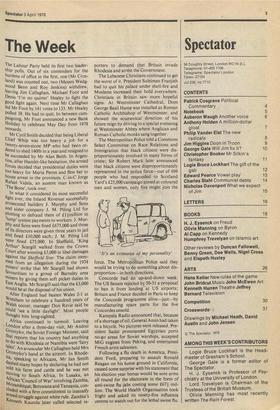The Week
The Labour Party held its first two leader- ship polls. Out of six contenders for the burdens of office in the first, one (Mr Cros- land) was counted out, two ( Messrs Wedg- wood Benn and Roy Jenkins) withdrew, leaving Jim Callaghan, Michael Foot and Denis 'I'm no quitter' Healey to fight the good fight again. Next time Mr Callaghan led Mr Foot by 141 votes to 133. Mr Healey Polled 38. He had to quit. In between cam- paigning, Mr Foot announced a new Bank Holiday to celebrate May Day from 1978 onwards.
Mr Cyril Smith decided that being Liberal Chief Whip was too heavy a job for a twenty-seven-stone M P who had been or- dered to shed 140lb in a yearand resigned to be succeeded by Mr Alan Beith. In Argen- tina, after Hamlet-like hesitation, the armed forces decided that presidential duties were too heavy for Maria Peron and flew her to house arrest in the provinces. C-in-C Jorge Rafael Videla, an austere man known as The Bone', took over.
In what it considered its most successful fight ever, the Inland Revenue successfully Prosecuted builders J. Murphy and Sons and sister company J. M. Piling Ltd for plotting to defraud them of £1!2million in lump' system payments to workers. J. Mur- phy and Sons were fined £675,000 and three of its directors were given three years in jail and fined £10,000 each; J. M. Piling Ltd were fined £75,000. In Sheffield, 'King Arthur' Scargill walked from the Crown Court after winning £3,000 in libel damages against the Sheffield Star. The claim stem- med from an allegation during the 1974 miners' strike that Mr Scargill had shown favouritism to a group of Barnsley area Miners by giving them soft picket duties in East Anglia. Mr Scargill said that the £3,000 would be at the disposal of his union. After England had beaten Wales 2-1 at Wrexham to celebrate a hundred years of Welsh soccer, manager Don Revie said he could 'see a little daylight'. Most people thought him long-sighted. Africa continued in turmoil. Leaving ' London after a three-day visit, Mr Andrei Gromyko, the Soviet Foreign Minister, said that reports that his country had anything to do with Rhodesia or Namibia were 'fairy tales'. An avuncular Mr Callaghan held Mrs r., ronlyko's hand at the airport. In Rhode- sia, speaking to Africans, Mr Ian Smith dashed many hopes by declaring he had not sold his farm and cattle and he was not moving to South Africa. In Lusaka, an African 'Council of War' involving Zambia, Mozambique, Botswana and Tanzania, con- cluded with a firm commitment to intensify armed struggle against white rule. Zambia's Kenneth Kaunda later called selected re-
porters to demand that Britain invade Rhodesia and arrest the Government.
The Lebanese Christians continued to get the worst of it. President Suleiman Franjieh had to quit his palace under shell-fire and Moslems increased their hold everywhere. Christians in Britain saw more hopeful signs. At Westminster Cathedral, Dom George Basil Hume was installed as Roman Catholic Archbishop of Westminster, and showed the ecumenical direction of his future reign by driving to a special evensong at Westminster Abbey where Anglican and Roman Catholic monks sang together.
The Metropolitan Police told a Commons Select Committee on Race Relations and Immigration that black citizens were dis- proportionately involved in many forms of crime; Sir Robert Mark later announced that black citizens were disproportionately represented in the police force—out of 699 people who had responded to Scotland Yard's £25,000 campaign aimed at coloured men and women, only five might join the 'It's an extension of my personality' force. The Metropolitan Police said they would be trying to do something about dis- proportion—in both directions.
Concorde had an up-and-down week. The US Senate rejected by 50-31 a proposal to ban it from landing at US airports; Britain and France decided in Paris to keep the Concorde programme alive—just—by manufacturing spare parts for the five Concordes unsold.
Kampala Radio announced that, because of a shortage of oil, General Amin had taken to a bicycle. No pictures were released. Pre- sident Sadat pronounced Egyptian ports no-go areas for Soviet warships, accepted MiG engines from Peking, and entertained French arms salesmen.
Following a flu death in America, Presi- dent Ford, preparing to assault Ronald Reagan on his home ground in California, caused some surprise with his statement that his election year bonus would be sore arms all round for the electorate in the form of anti-swine flu jabs costing some £67 t mil- lion. The World Health Organisation took fright and asked its ninety-five influenza centres to watch out for the lethal swine flu.


































 Previous page
Previous page